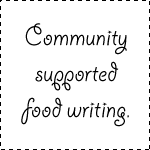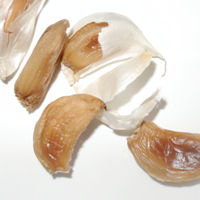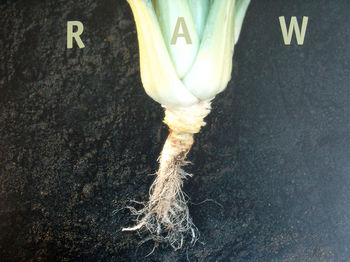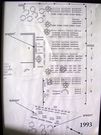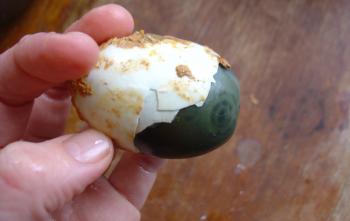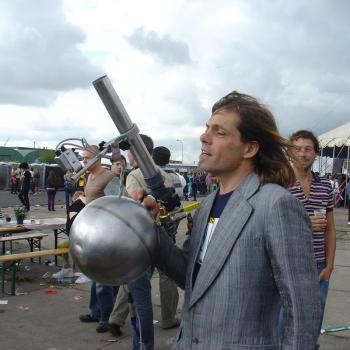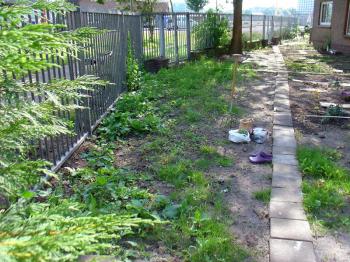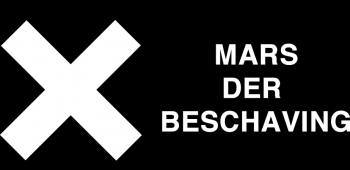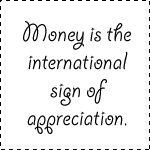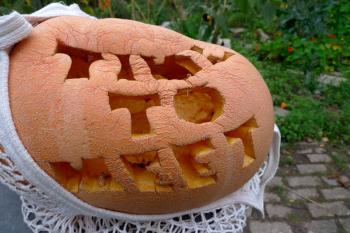The real dirt on
Farmer Wim’s clogs
October 29, 2009
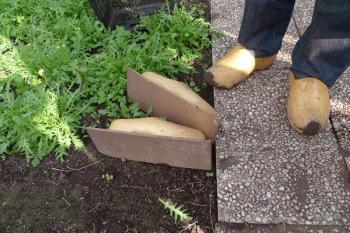
Guess you could nail a shingle to any old shoe…
On a recent trip to the border between rural and urban Amsterdam I got a look-see into the tamping-technique of Farmer Wim Bijma. He produces organic leafy greens that you can order online and pick up on site. Despite it’s reputation, it’s a beautiful bike ride out to Osdorp. If you enjoy experiencing the contrast between a densely built city, and 900 year old farmland, the ride will be entirely your cup of tea.
debra at 11:04 | Comments (1) | post to del.icio.us
A time to meet,
a time to compost
your jack o’ lantern
October 14, 2009
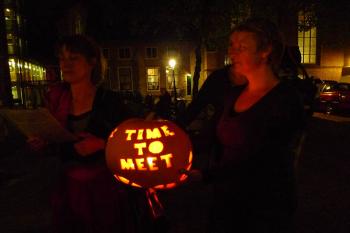
Time to Meet jack o’ lantern gifted to the UM dinner by Alowieke of Transition Town Utrecht.
When Guus Beumer, artistic director of the Utrecht Manifest: Biennial for Social Design, asked me what I would like to contribute to the 2009 edition, I responded with a programme called Ultimate Meeting. I would invite a strategic group of people together for dinner to start planning resilient local food-systems. Due to its non-commercial nature, this activity was constantly being placed on the back burners of our agendas. It was high time to meet.
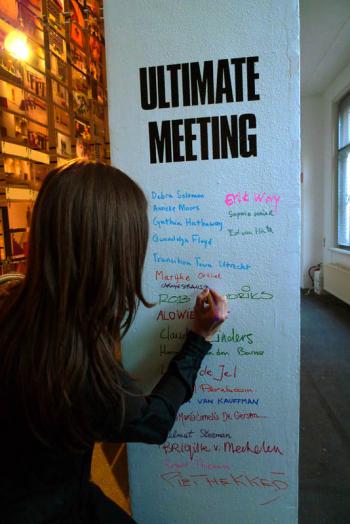
Forced authorship of the plan, guests sign in
As part of the UM programme Unforseen Magic, the Ultimate Meeting dinner was held last Thursday in Bas van Tol’s Koers Locale at Centraal Museum’s CM studio. Koers Locale was van Tol’s prescient W139 installation in 1992, a year before the public opening of the internet in the Netherlands. The installation represented the end of 80’s artist-activism before the digital public access of the 90’s temporarily turned the physical side of social engagement on its ear. As a location for the Ultimate Meeting, the Koers Locale was a fitting backdrop for a gathering of vital (Utrecht) food-related voices to come together and hash out some essential food system issues. I invited folks that by coincidence or by social construct until now had not been in communication with each other, folks who’s agendas would mutually benefit through discussion. Illustrious guests included representatives from Transition Town Utrecht Alowieke and Helmut, (who came bearing gifts!), Louis & Roland from Lekker Utregs, Rob from the City of Utrecht Planning and Development, Marijke from New Utrecht and a slew of other very important designers and design writers slash philosophers.
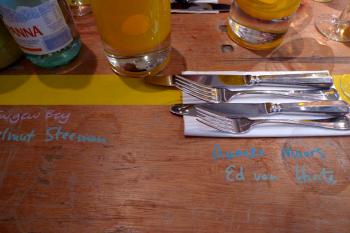
Indelible seating arrangements
The subject of urban food production is an urgent one. We don’t flinch when we hear the term ‘national security’, and we are complicit with our governments’ actions, often to the detriment of our own civil liberties. But somehow we accept it as reasonable that we have a four-day food supply in urban areas. In this country we have a well-worked out 200-year plan for land and water management but only a four-day food supply that is by design dependent on fragile infrastructure.
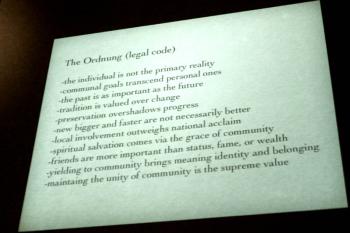
Ordnung muß sein. Cynthia Hathaway and Gwendolyn Floyd floored us with a presentation on the sustainable design principles of the Old Order Amish and Mennonites.
Food sovereignty is our right to define and produce our own food, our own forms of agriculture, how we will raise and treat our livestock and fisheries, and how we will ‘harvest’ ‘our’ oceans, in contrast to having our food supply primarily subject to global market forces largely beyond our control. Someone slightly more activist than I might posit that the folks in charge of our food since 1947, (the authors of the so-called Green Revolution) have done a consistently crap job. By the folks in charge I am referring to the policy level and the highest levels of the industrial food and agriculture business. These folks are responsible for creating and maintaining poorly designed food systems that result in food scarcity in parts of the world (some closer by than you may think), in high rates of farmer suicide, in the destruction of our natural habitat that is a prime contributor to the dangerous and sometimes irreversible forces effecting our climate. Creating effective means to invest in our own ‘resilient local food economies’ is a powerful mechanism for change. It is in this spirit that I held the Ultimate Meeting.
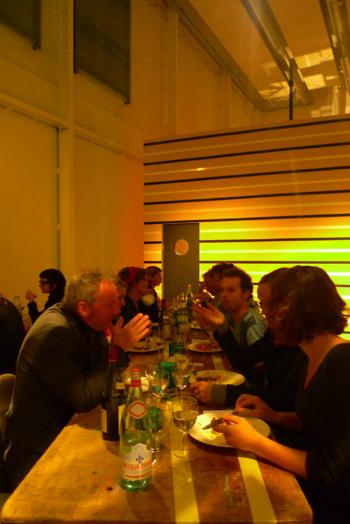
Guests simultaneously eat and save the world
Was this dinner successful? Did it meet my goals? Upon leaving, one guest held up his hand, and gesturing with his thumb and forefinger 8cm apart joked, ‘Tonight we made the world this much better.’ Now I don’t know how Ed managed to calculate a 4,5% improvement in the ‘world’ from this one little dinner in Utrecht, but he must have been thinking about the huge effect of all of those ultimate meetings of the past. The ones in which some economists and agronomists from 1947 onward decided that we should be spending less money on food and more money on flat screen TVs and cars. And throw-away fashion. The stuff that makes the ‘Economy’ grow. Now if you subtract all that stuffy-stuff, factor in one heq of a lot of social engagement and carry the two, it seems you do end up getting something close to a 4,5% improvement. Ed, that is huge!
But seriously, on a practical level? The Ultimate Meeting had 24 guests. Transition Town Utrecht now knows 4 people in or related to the city council and 8 designers and 1 researcher that they can engage in setting up their food systems. Lekker Utregs has met at least 6 people that can be specifically useful in setting up their urban agriculture conference in November. 3 separate food entrepreneurs have met with 8 different people that have experience in setting up local food economies both on the farm and social entrepreneurial side. 8 internationally recognised designers have been introduced to the design principles of the Amish, the social design skills of the Transition Town movement and have opened themselves and their design practice to opportunities dealing with creating resilient (food) systems. One design magazine editor-in-chief was introduced to and became fascinated by the Transition Town movement. Probably more than but at least one conceptual artist and one researcher have learned about the activist tradition of Utrecht. And all 24 of us present at the Ultimate Meeting have committed ourselves to working to create food systems with a primarily social face. And that is huge.
-
Utrecht Manifest, 3rd Biennial for Social Design
4–17 October 2009 (the exhibitions last longer)
The starting point is the utopian potential of Modernism, which has left explicit physical and mental traces in Utrecht…
the positioning of modernism was initially focused on engagement, and in the second place on design with a social ambition.Images from the Ultimate Meeting
on Debra Solomon’s FlickR pageUltimate Meeting, Oct 08, 2009
Present: Debra Solomon, Anneke Moors, Cynthia Hathaway, Gwendolyn Floyd, Marijke Orthel, Rob Hendriks, Alowieke, Claudia Linders, Hanneke vd Barne, Louis de Jel, Roland Pereboom, Joshua Kauffman, AMC deGersem, Helmut Steeman, Brigitte van Mechelen, Robert Thiemann, Piet Hekker, Erik Wong, Sophie Krier, Ed van Hinte, Jurgen Bey, Carolyn Strauss, Ana Paula.Delicious food by: Chris Igesz, Bauke and Martijn
Utrecht Manifest: Hanneke Beukers; wonderful production, Olga Godschalk, Marjolein
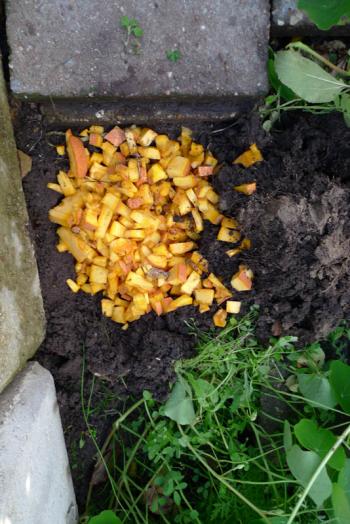
A time to bury jack o’ lanterns as compost, a time to grow green manures.
debra at 16:31 | Comments (1) | post to del.icio.us
